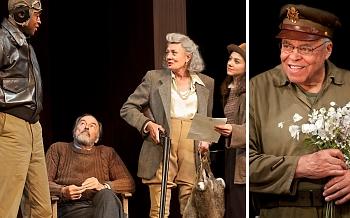Much Ado About Nothing Review Old Vic 2013
On the face of it at least, this production of Shakespeare's play (written around 1598) had considerable potential. First, it boasts two highly regarded and experienced actors in the lead roles - the American actor, James Earl Jones and our much-loved Vanessa Redgrave. And the director is Mark Rylance, who has entranced us all in the past not only with his own performances, for example in 'Jerusalem', but for ten years he was the first artistic director at Shakespeare's Globe Theatre. That kind of combination might suggest a sure-fire hit. But I'm afraid it is anything but - leading one to conclude that the title might apply as much to the production itself as to Shakespeare's comedy.
One of the key aspects of this play is the relationship between Benedick (James Earl Jones) and Beatrice (Vanessa Redgrave). The basic idea here is that neither of these two seems to be the marrying kind, and they also (supposedly) despise each other - there's a "kind of merry war between the two". That allows for sparks to fly between them, but it requires energy and vitality, but we get almost none of that here. In fact, I think that Beatrice and Benedick are in love with each other right from the start of the play. But we get no inkling of that here either. And even when they do acknowledge their love, it seems casually half-hearted and almost insignificant.
During the first half, the overall pace was rather pedestrian and confusing. Much of the time, I found it hard to hear what many of the cast were saying. Part of the problem may lie with the extraordinary arch-like object standing in the middle of the stage absorbing sound or bouncing it off into the remote crannies of the theatre. But the music also distracts, and I found some of the American accents difficult to attune to, particularly James Earl Jones who often seemed to be mumbling and frequently stumbling through his lines in a way that focused one's attention not on what he was saying or doing, but on worrying about whether he would manage to get to the end of a sentence.
Things improve somewhat in the second half with the welcome appearance of Dogberry, here played by the ever-excellent Peter Wight, who also doubles-up as the priest. Riding a bike and dressed as an English country Bobby, Mr Wight manages to inject some much-needed humour into the proceedings. But, rather strangely, the audience hardly laughed at any of his malapropisms which seemed odd unless many had dozed-off by that juncture. Mark Rylance has cast children here to play Dogberry's watchmen, Hugh Oatcake and George Seacoal. That seems like a neat idea, particularly given the time-setting and the fact that the children are dressed as scouts. But it doesn't really convince when the kids have to capture two US servicemen and cart them off to be interrogated, and the cymbol-bashing constable's side-kick was absurdly and crudely amateurish.
In his programme notes, Mark Rylance says that the "production was born from the idea of Benedick and Beatrice being played by James Earl Jones and Vanessa Redgrave." But he doesn't say whose idea it was, and if it was a good idea in the first place. He does praise his leading actors, and acknowledges their undoubted talents and inspiration during rehearsals. However, there is little evidence of that inspiration in the performances nor of the energy and fizz which needs to be the essential ingredient in the relationship between the two main characters. I am sure that could have been achieved. But, as it stands, this production has more in common with a village church hall production of the 1940s or, perhaps more aptly, a 'Dad's Army' version.
"I am the last person to complain about senior citizens being given free rein. I also hold Vanessa Redgrave and James Earl Jones in high regard and thought their performances in Driving Miss Daisy were magical. But casting them as Beatrice and Benedick is another matter and results, in Mark Rylance's hands, in one of the most senseless Shakespearean productions I have seen in a long time."
Michael Billington for The Guardian
"Benedick is renowned for his wit, but [James Earl]Jones's delivery of the lines is so slow and hesitant, that whenever he embarks a speech one worries whether he will get safely to the end of it...Vanessa Redgrave is much more fluent and often funny, though it still takes a bit of effort to accept a Beatrice who often seems like a mad old bat. And while the pair suggest a wry affection for each other, that's not quite enough to ignite the play... Laborious and misguided production."
Charles Spencer for Daily Telegraph
"Vanessa Redgrave, 76, is co-starring in Much Ado - her stage beau being James Earl Jones, 82. The idea is that you are never too old to fall in love. But is it possible to be too old to play a Shakespearean lover? So noble is the idea of the enterprise, so distinguished have been its two prime participants, that one feels a cur to say so. But this production creaks...Disappointing evening."
Quentin Letts for The Daily Mail
"It is a strange and largely unsatisfactory experience... underpowered and confused. This Much Ado may be a bold enterprise but it does not pay off."
Henry Hitchings for The Evening Standard
External links to full reviews from popular press
Guardian - Telegraph -
Originally published on
